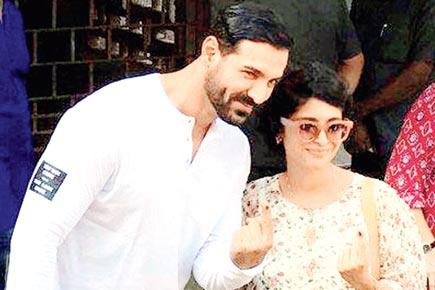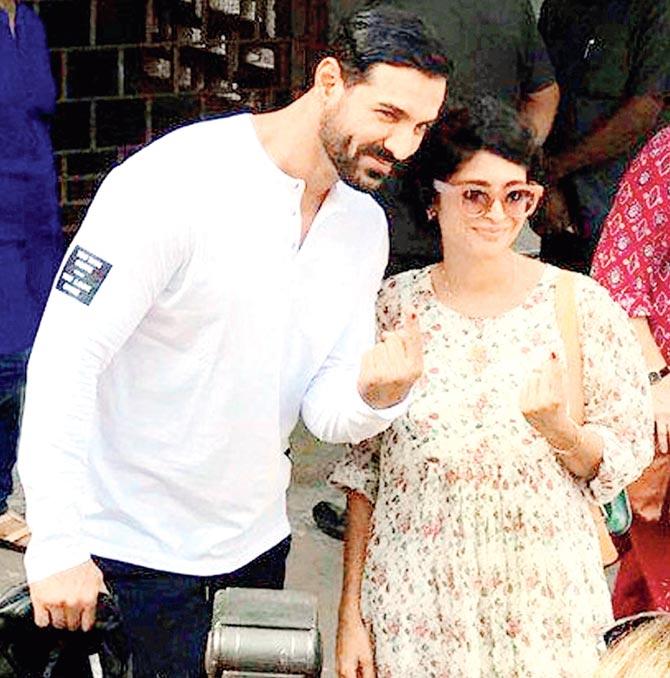For a few years now, the act of voting has become a style statement. Newspapers ritually carry a photograph of some celebrity showing us their voting finger with its ink stain. Social media updates have become mandatory, also sometimes accompanied by a picture, some of direct, some artful

John Abraham and Kiran Rao show their inked fingers after casting their votes at the recently held BMC elections. Pic/PTI

John Abraham and Kiran Rao show their inked fingers after casting their votes at the recently held BMC elections. Pic/PTI
 For a few years now, the act of voting has become a style statement. Newspapers ritually carry a photograph of some celebrity showing us their voting finger with its ink stain. Social media updates have become mandatory, also sometimes accompanied by a picture, some of direct, some artful.
For a few years now, the act of voting has become a style statement. Newspapers ritually carry a photograph of some celebrity showing us their voting finger with its ink stain. Social media updates have become mandatory, also sometimes accompanied by a picture, some of direct, some artful.
ADVERTISEMENT
This year, the BMC election campaigning was more robust than we've ever seen it. It also had a squeaky new shininess to it. Everywhere you went, you saw groups of people campaigning in clothes as brightly white as a Barista tubelight. There were lots of billboards. There were many exhortations in the media. This was the crescendo of a style of talking about voting that has been gathering speed for the last few years.
On the day of the elections some stores offered a discount — show your voting mark and get a 20% discount. This was both startling and very fitting indeed. The act of voting has been converted into an act of consumption. It is only logical that it is conflated with the act of purchase carried out by the consumer as citizen and the citizen as consumer. On the day following the election too, the citizen-consumer is thanked in the manner of shareholders. This mediatised interaction by political bodies is carried out in the same space in newspapers usually reserved for advertising. It builds the same kind of relationship with the consumer citizen as brands do.
What then, is the product that is sold through this interaction? It is the entire complexity of political engagement, boiled down to an app-like political object – the vote. It is a kind of svachha politics, erased of all its knotty issues. For the middle classes, the idea that "politics is a dirty business" has been a long-chanted mantra, which allows one to pretend that by not voting, or by not caring about political choices, they are preventing their souls from being sullied by all that politics represents. It is an incantation that allows people to imagine that they are no part of or implicated in political processes, which are made up of elaborate equations of privilege and identity.
Through the svaccha politics idea, consumer-citizens are now able to divorce the violence underlying politics because voting becomes the primary political activity. Once we have voted, we may just keep defending the purchase/vote of our choice rather than engage with political ideas for themselves. It allows people to even more sharply divorce themselves from an occurrence like, say, recent violence on the Delhi University campus where members of the ABVP beat up teachers and students, and hunted students out from their paying guest accommodations to attack them later. The voter can pretend that they are not implicated in these political moments by only visiting the mall of voting and reading its advertising supplement, the television news cycle which also focuses cyclically only on a few incidents rather than a more sustained political analysis.
But, to reduce a citizen's political activity to the simple act of voting, is the same as reducing sexual life to the act of intercourse, rather than the complex weave of consent, agency, health, gender and eroticism. Similarly, voting too is only one (though important) part of a thriving political engagement, one we deeply need to remember and rebuild in ourselves as citizens today.
Paromita Vohra is an award-winning Mumbai-based filmmaker, writer and curator working with fiction and non-fiction. Reach her at www.parodevipictures.com
 Subscribe today by clicking the link and stay updated with the latest news!" Click here!
Subscribe today by clicking the link and stay updated with the latest news!" Click here!







